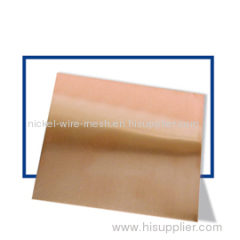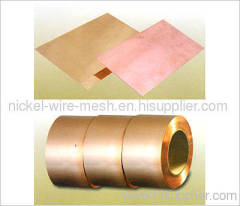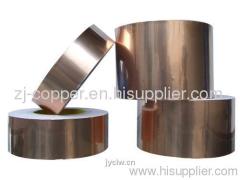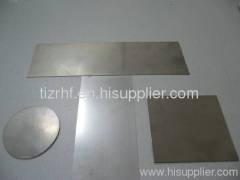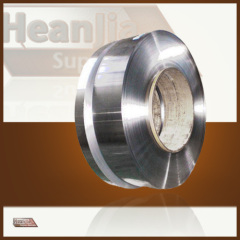
Nickel titanium Alloy sheet plate strip
| Min. Order: | 30 Square Meter |
|---|---|
| Payment Terms: | L/C, D/P, D/A, T/T, WU |
| Supply Ability: | 10,000 squaremeters/month |
| Place of Origin: | Hebei |
Company Profile
| Location: | Beijing, China (Mainland) |
|---|---|
| Business Type: | Manufacturer, Trading Company |
| Main Products: | Nickel Wire Mesh, Monel 400 Wire Mesh Demister, Incoloy Sheet Plate Strip, Monel Sheet Plate Strip, Inconel 625 Alloy Strip Sheet Plate |
Product Detail
| Model No.: | Thickness: Min0.05mm |
|---|---|
| Means of Transport: | Ocean, Air, Land |
| Brand Name: | Xinxing |
| titanium sheet plate strip: | Nickel titanium Alloy sheet plate strip |
| Production Capacity: | 10,000 squaremeters/month |
| Packing: | Standard package |
| Delivery Date: | 2~30days |
Product Description
Nickel titanium Alloy sheet (plate strip) / Nitinol Sheet (plate strip):
Sizes:
Nickel titanium Alloy Plate: Thickness 4.76-60mm,
Nickel titanium Alloy Sheet: Thickness 0.5-4.75mm,
Standard: ASTM, AMS, MIL
Sizes:
Nickel titanium Alloy Plate: Thickness 4.76-60mm,
Nickel titanium Alloy Sheet: Thickness 0.5-4.75mm,
Standard: ASTM, AMS, MIL
Nickel titanium Alloy
Introduction
Nickel titanium, also known as nitinol, is a metal of alloy of nickel and titanium, where the two elements are present in roughly equal atomic percentages.
Nitinol alloys exhibit two closely related and unique properties: shape memory and super-elasticity (also called pseudo-elasticity). Shape memory refers to the ability of Nitinol to undergo deformation at one temperature, and then recover its original, undeformed shape upon heating above its "transformation temperature". Superelasticity occurs at a narrow temperature range just above its transformation temperature; in this case, no heating is necessary to cause the undeformed shape to recover, and the material exhibits enormous elasticity, some 10-30 times that of ordinary metal.
Nitinol's extraordinary ability to accommodate large strains, coupled with its physiological and chemical compatibility with the human body has made it one of the most commonly used materials in medical device engineering and design.
Applications
There are four commonly used types of applications for Nitinol.
- Free Recovery: Nitinol is deformed at a low temperature, and heated to recover its original shape.
- Constrained Recovery: The same, except that recovery is rigidly prevented, and thus a stress is generated.
- Work Production: Here the alloy is allowed to recover, but to do so it must act against a force (thus doing work).
- Superelasticity: As discussed above, here the Nitinol acts as a super spring.
Predicted uses
l Couplings
l Biomedical and medical
l Toys, novelty items
l Actuators
l Heat Engines
l Sensors
l Cryogenically activated die and bubble memory sockets, and finally
l Lifting devices


